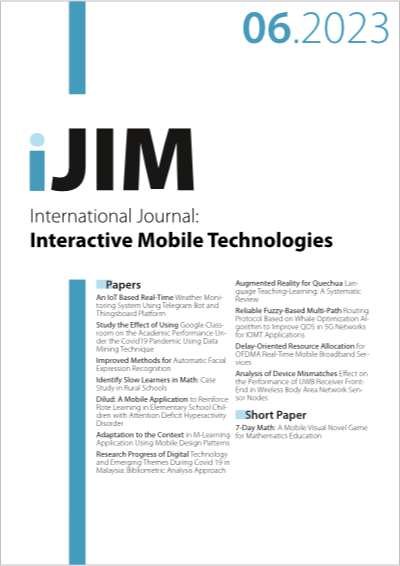Delay-Oriented Resource Allocation for OFDMA Real-Time Mobile Broadband Services
DOI:
https://doi.org/10.3991/ijim.v17i06.35885Keywords:
LTE, Downlink Recourse Allocation, MAC Scheduler, QoS, Greedy Algorithm, Delay, FairnessAbstract
Radio Resource Management (RRM) is the key component that influences the Quality of Service (QoS) in emerging mobile systems. The harsh requirements of recent multimedia applications press on the behavior of the resource allocation model at the Medium Access Control (MAC). This, under certain conditions, deteriorates awareness of the scheduler in satisfying QoS characteristics for the diverse attending traffic flows. The trade-off between QoS metrics may be a viable remedy to this problem. However, if the tradeoff is not meticulously addressed, it definitely increases the delay beyond the allowed threshold and plummets the data rates of the involved flows. In this article, a Delay-oriented Resource Allocation (DoRA) scheduler is proposed for the downlink channel to transmit multimedia applications. The main aim of DoRA is to schedule flows of different volumes with guaranteed low delay values and acceptable throughput under harsh network conditions (i.e., high traffic load and mobility). An efficient priority weight function is formulated based on a delay-oriented rule considering the buffer delay of the diverse flows. Eventually, a greedy algorithm assigns channel resources to the prioritized flows with high weights. DoRA is compared to reference schedulers using system-level simulation over two scenarios. The performance results indicate that DoRA maintains a low end-to-end delay with robust throughput and efficient spectrum efficiency for different flow volumes over congested network states.
Downloads
Published
How to Cite
Issue
Section
License
Copyright (c) 2023 Nadim Madi, AO Najim

This work is licensed under a Creative Commons Attribution 4.0 International License.



